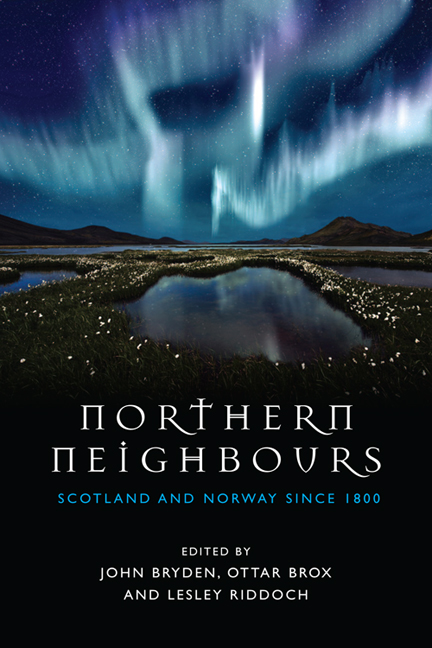Book contents
- Frontmatter
- Contents
- Acknowledgements
- Foreword
- 1 Introduction
- 2 Towards a Theory of Divergent Development
- 3 Cousins Divided? Development in and of Political Institutions in Scotland and Norway since 1814
- 4 Agrarian Change in Scotland and Norway: Agricultural Production, Structures, Politics and Policies since 1800
- 5 The Evolution of Local Government and Governance in Scotland and Norway
- 6 The Development of Industry and North Sea Oil in Scotland and Norway
- 7 Reflections on the Making of Norway
- 8 Money and Banking in Scotland and Norway
- 9 Religion in Scotland and Norway
- 10 The Nordic Welfare Model in Norway and Scotland
- 11 Access, Nature, Culture and the Great Outdoors – Norway and Scotland
- 12 Education in Norway and Scotland: Developing and Re-forming the Systems
- 13 Norway and the United Kingdom/Scotland after the Second World War
- 14 Conclusions
- The Contributors
- Bibliography
- Index
13 - Norway and the United Kingdom/Scotland after the Second World War
Published online by Cambridge University Press: 05 August 2016
- Frontmatter
- Contents
- Acknowledgements
- Foreword
- 1 Introduction
- 2 Towards a Theory of Divergent Development
- 3 Cousins Divided? Development in and of Political Institutions in Scotland and Norway since 1814
- 4 Agrarian Change in Scotland and Norway: Agricultural Production, Structures, Politics and Policies since 1800
- 5 The Evolution of Local Government and Governance in Scotland and Norway
- 6 The Development of Industry and North Sea Oil in Scotland and Norway
- 7 Reflections on the Making of Norway
- 8 Money and Banking in Scotland and Norway
- 9 Religion in Scotland and Norway
- 10 The Nordic Welfare Model in Norway and Scotland
- 11 Access, Nature, Culture and the Great Outdoors – Norway and Scotland
- 12 Education in Norway and Scotland: Developing and Re-forming the Systems
- 13 Norway and the United Kingdom/Scotland after the Second World War
- 14 Conclusions
- The Contributors
- Bibliography
- Index
Summary
NORWAY–BRITAIN RELATIONS AFTER THE SECOND WORLD WAR
In the autumn of 1956, the Norwegian Prime Minister, Einar Gerhardsen, and his wife Werna were invited to the United Kingdom for an official visit. The invitation was a direct consequence of the Gerhardsens having paid a State visit to the Soviet Union the year before. British sources reported that the Norwegian premier had been much taken in by the Soviet system, hence the invitation to London to counteract these impressions and influences and to strengthen Norway's adherence to the Atlantic alliance. The Norwegian premier had strongly indicated that he saw himself as a kind of bridge-builder between the East and the West. Gerhardsen belonged to the Norwegian Labour Party, Arbeiderpartiet, which had excellent relations with its British counterpart Labour. But Labour had been out of power since 1951. The Conservative government in Britain wanted to strengthen and maintain good relations with Norway, also to show that the Tories had no intention of dismantling the British welfare state, but rather to maintain and strengthen it. The planners in London took great care to showcase for Gerhardsen different aspects of the successful British welfare state. Interestingly, apart from these more general considerations, the absence of genuine Anglo–Norwegian relations is striking. The interlocutors simply did not have much in common or much to talk about. But this is not only the case for 1956, for the whole period under consideration here there was little in terms of real-life alliance politics and relations, despite much official rhetoric to the contrary.
It was standard operating procedure in Whitehall that prior to State visits, the Foreign Office mandarins provided background material and briefing papers for the ministers. This material routinely consisted of a summary of the most important bilateral relations between the United Kingdom and the country of origin for the visiting head of state, a discussion and analysis of the state of affairs, and suggestions for the politicians on how to handle the issues. Going through the material in the National Archives in Kew, it is quite astonishing that there are hardly any Anglo–Norwegian issues that should warrant high-level political discussions.
- Type
- Chapter
- Information
- Northern NeighboursScotland and Norway since 1800, pp. 269 - 281Publisher: Edinburgh University PressPrint publication year: 2015



